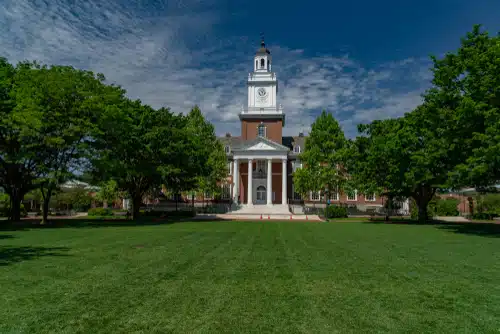Exploring Johns Hopkins’ Pre-College Programs
The transition from high school to college can be an overwhelming experience for most students. It involves a significant shift in academic intensity, new independence, and navigating unfamiliar environments. Many institutions offer pre-college programs to help ease this transitional process, providing prospective students with realistic insight into college life. One such institution is Johns Hopkins University, which has distinguished itself with its rich, engaging, and enlightening pre-college programs.
Understanding Pre-College Programs
The Concept and Purpose of Pre-College Programs
Pre-college programs bridge high school and college, easing the academic, emotional, and social transitions between these two different learning settings. These programs focus on providing high school students with a hands-on, immersive insight into college life, academics, career options, and personal growth opportunities.
By participating in pre-college programs, students not only gain exposure to the college environment but also have the chance to experience the excitement and challenges that come with it. They get a taste of what it’s like to live on campus, attend lectures, and engage in discussions with professors and fellow students. This firsthand experience helps them develop realistic expectations of college life and prepares them for the independence and responsibility that comes with it.
Moreover, pre-college programs aim to nurture students’ individual talents and interests. These programs offer a wide range of academic and extracurricular activities, allowing students to explore different fields and discover their passions. Pre-college programs provide students with opportunities to develop their skills and strengths, Whether through hands-on laboratory experiments, artistic performances, or leadership workshops.
Additionally, pre-college programs focus on enhancing critical thinking skills and building a strong foundation for future academic success. Through challenging coursework, research projects, and collaborative learning experiences, students are encouraged to think analytically, solve problems creatively, and communicate effectively. These skills are essential for success in college and beyond, as they lay the groundwork for lifelong learning and professional growth.
The ultimate objective of pre-college programs is to help students make informed decisions about their higher education and career trajectories. By exposing them to various academic disciplines and career options, these programs empower students to explore their interests and make educated choices. Whether a student discovers a passion for engineering, literature, or business, pre-college programs provide guidance and resources to help them navigate their academic and career paths.
The Role of Pre-College Programs in Higher Education
Pre-college programs play a crucial role in shaping student success in higher education. They help to demystify the college experience, provide rigorous academic preparation, and enhance social readiness amongst prospective students. These programs foster a more seamless transition to college by helping students acclimate to the rigors of college academics and the nuances of university life.
One of the key benefits of pre-college programs is the academic preparation they offer. Students are exposed to college-level material and expectations through challenging coursework and academic support. This exposure helps them develop the necessary skills and knowledge and boosts their confidence in their ability to succeed in a college setting. By the time they enter college, pre-college program participants are already familiar with the academic demands and are better equipped to handle the challenges that come their way.
Moreover, pre-college programs provide students with a unique opportunity to build social connections and develop a sense of belonging within the college community. Through group projects, team-building activities, and social events, students are able to form friendships and establish support networks. This social readiness is crucial for a smooth transition to college, as it helps students feel connected and supported, reducing feelings of isolation and homesickness.
Furthermore, pre-college programs allow students to explore majors that align with their interests and future career goals and provide a distinct academic advantage. By taking courses in their desired field of study, students can better understand the subject matter and determine if it is the right fit for them. This exposure helps students enter college with a clear understanding of what to expect and how they can maximize their academic journey.
In conclusion, pre-college programs serve as a valuable stepping stone for high school students on their path to higher education. These programs provide a glimpse into college life and offer a wide range of academic, social, and personal growth opportunities. By participating in pre-college programs, students are better prepared for the challenges and opportunities in college, setting them up for future success.
An In-Depth Look at Johns Hopkins Pre-College Programs
As one of the leading institutions in the world, Johns Hopkins provides a diverse range of programs that cater to different academic interests, allowing students to delve into their passions and gain valuable knowledge and experience.
Students have the opportunity to participate in the Johns Hopkins pre-college programs in Baltimore, where they will have access to the extensive resources offered by Johns Hopkins University, including its libraries and other facilities, as well as extracurricular activities designed to help high school students relax and foster connections with their peers, teachers, and adult role models.
In addition, high school students can get their education online, where they can study at their own speed and from any location, interact with other students in a lively online community, and participate in various fun online activities.
Here are the following Johns Hopkins pre-college programs:
On-Campus Programs
High school students can participate in college-level coursework taught by outstanding Johns Hopkins faculty members, with guest lectures delivered by leading academics and industry professionals.
A typical day for students consists of morning lectures conducted by instructors, followed by afternoon outings, presentations by guest speakers, and other exciting possibilities for socializing and furthering their studies.
The following is a list of some on-campus courses that high school students can select from within the online Johns Hopkins pre-college programs.
Exploring the Universe with Space Telescopes – AS.171.135
You will discover how astronomers examine things in space by utilizing a variety of lighting conditions, observatories, and instrumental approaches through a combination of in-class lectures and hands-on lab exercises.
You will also hear from active researchers about the major unanswered problems in astronomy and how we hope to answer those questions with space observatories such as Hubble and Webb.
On the basis of this information, you will collaborate with a small group to create your very own space telescope, which you will then display to the other students in the class. There is no expectation that you have any prior knowledge of astronomy, physics, or mathematics.
Medical School Intensive – AS.020.132
Participating in interactive lectures and laboratories is the best way to acquire the fundamental information and skills necessary for a career in surgery, internal medicine, pediatrics, emergency medicine, and biomedical science.
At one of the most prestigious educational establishments in the country, you and your fellow high school students, under the instruction and direction of professionals working in the medical area, will investigate new facets of this vitally important field.
Minds and Machines – AS.140.316
Are the mind and the brain one and the same thing? Is it possible that the mind (or the brain) is a computer? Is it possible for a computer to think, feel, or make morally questionable decisions? How has the use of computers altered our mental processes? This class takes a philosophical and historical approach to investigating such concerns.
Early research on AI, computationalism, connectionism, 4EA cognitive science, simulation theory, and Singularity are some topics covered in this course.
Introduction to Surgery – AS.020.134
Acquire a comprehensive knowledge of surgery by becoming familiar with its historical landmarks, surgical anatomy, pre-and post-operative patient care, subspecialties within the discipline, and surgical technology.
Complete daily modules, which may include content from lectures as well as activities that provide the opportunity to apply what you’ve learned about the subject matter. This program is intended to pique your interest in a wide variety of medical professions, from surgery and nursing to biomedical engineering, so that you might pursue those fields further.
Online Programs
Students can participate in the curriculum of the Summer Programs through the use of online offerings that are interactive and flexible in design. The self-paced program for high school students is almost always offered asynchronously; however, the student’s instructor may also schedule live interactions.
The curriculum for the students ought to emphasize these chances in addition to other significant program deadlines. In addition, it is anticipated that students will devote around 15 hours per week toward the completion of the program.
The following is a selection of the online courses available to high school students as part of the online Johns Hopkins pre-college programs.
Anatomy, Physiology, and Disease – AS.020.131
You are probably aware that having a solid grasp of physiology is an extremely valuable skill set for any aspiring medical professional, scientist, or other healthcare practitioner. Learn about the human body’s traditional anatomy and physiology, covering topics such as the neurological, muscular, cardiopulmonary, renal, digestive, and immune systems, and gain an understanding of how each system contributes to either health or disease.
In addition to the work you do in the classroom, you will have the opportunity to participate in activities that require you to synthesize the information you have learned. The understanding of the fundamental physiological processes that you will acquire via participation in this program will be useful to you in the future if you plan to pursue studies in biomedicine or other scientific fields.
Applications of Chemistry in Medicine – AS.030.104
Learn about the tremendous contributions that chemistry, one of the oldest scientific disciplines, has made to a variety of fields, including health care, medicine, pharmaceutical sciences, materials and polymer science, and forensic chemistry.
For instance, doing chemical research and creating new compounds are both necessary steps in the manufacture of brand-new pharmaceuticals.
Additionally, chemistry is an essential component in the expansion and development of a variety of consumer-oriented sectors, including those dealing with pigments and paints, pharmaceuticals and cosmetics, as well as oil and natural gas. You will be concentrating on the applications of chemistry in the medical and pharmaceutical sciences during the course of this program.
Epidemics, Pandemics, and Outbreaks – AS.360.146
It is more important than ever before to have a deeper understanding of the evolution of outbreaks, epidemics, and pandemics in the midst of a global pandemic that has shifted the ways in which we move, work, and interact with others around the world.
This is because the pandemic has shifted the ways in which we move, work, and interact with others around the world. You will investigate a selection of infectious and non-infectious diseases that affect public health around the world, including COVID-19, Ebola, Zika, and HIV, as well as diabetes, cancer, cardiovascular disease, injuries, and mental health.
Investigate the extent to which these diseases affect people worldwide and the many approaches to disease prevention that international and national organizations are pursuing. This program will encourage participation from a wide audience by utilizing a format that includes student presentations, as well as lectures, and group discussions.
Benefits of Participating in Johns Hopkins Pre-College Programs
Academic Advantages
Pre-college programs at JHU offer substantial academic benefits. They help students delve into subjects that interest them, improve their academic skills, and gain college-level experience that can set them apart in college applications and future career paths.
Moreover, by studying under the guidance of Johns Hopkins’ world-class faculty, students get a unique opportunity to engage with leading scholars and professionals in their field of interest. This interaction can provide a significant impetus to their learning journey.
Personal Growth Opportunities
Beyond academic growth, these programs also facilitate holistic personal development. They foster independence, build leadership skills, and nurture essential soft skills like time management and teamwork.
Living and studying alongside like-minded individuals from around the world also helps students develop a global perspective, enhance their cultural understanding, and build lifelong friendships.
Admission Process for Johns Hopkins Pre-College Programs
Eligibility Criteria
Applicants must be current high school students aged 15-19. They are expected to be academically prepared for college-level work and have a solid command of the English language. The programs seek students who are intellectually curious, motivated, and prepared to engage fully in rigorous study.
Application Procedure and Deadlines
Interested students must submit an online application form and the required materials, typically academic transcripts and English Language Proficiency and Evaluation of International Official Transcripts for international students.
Applications for summer courses usually open in early winter and continue until filled. However, given the popularity of JHU’s pre-college programs, students are encouraged to apply as early as possible to secure their preferred program choice.
In conclusion, Johns Hopkins pre-college programs offer a rewarding and enriching experience for high school students aiming for success in college and beyond. Their uniquely tailored curriculum and innovative programming design offer a glimpse into the richness of the college experience while setting up students for success in their chosen career paths.
If you need help putting the finishing touches on your college applications, at AdmissionSight, we have over 10 years of experience guiding students through the competitive admissions process.
AdmissionSight can help you put your best foot forward when applying to college this fall. Contact us today for more information on our services.








































